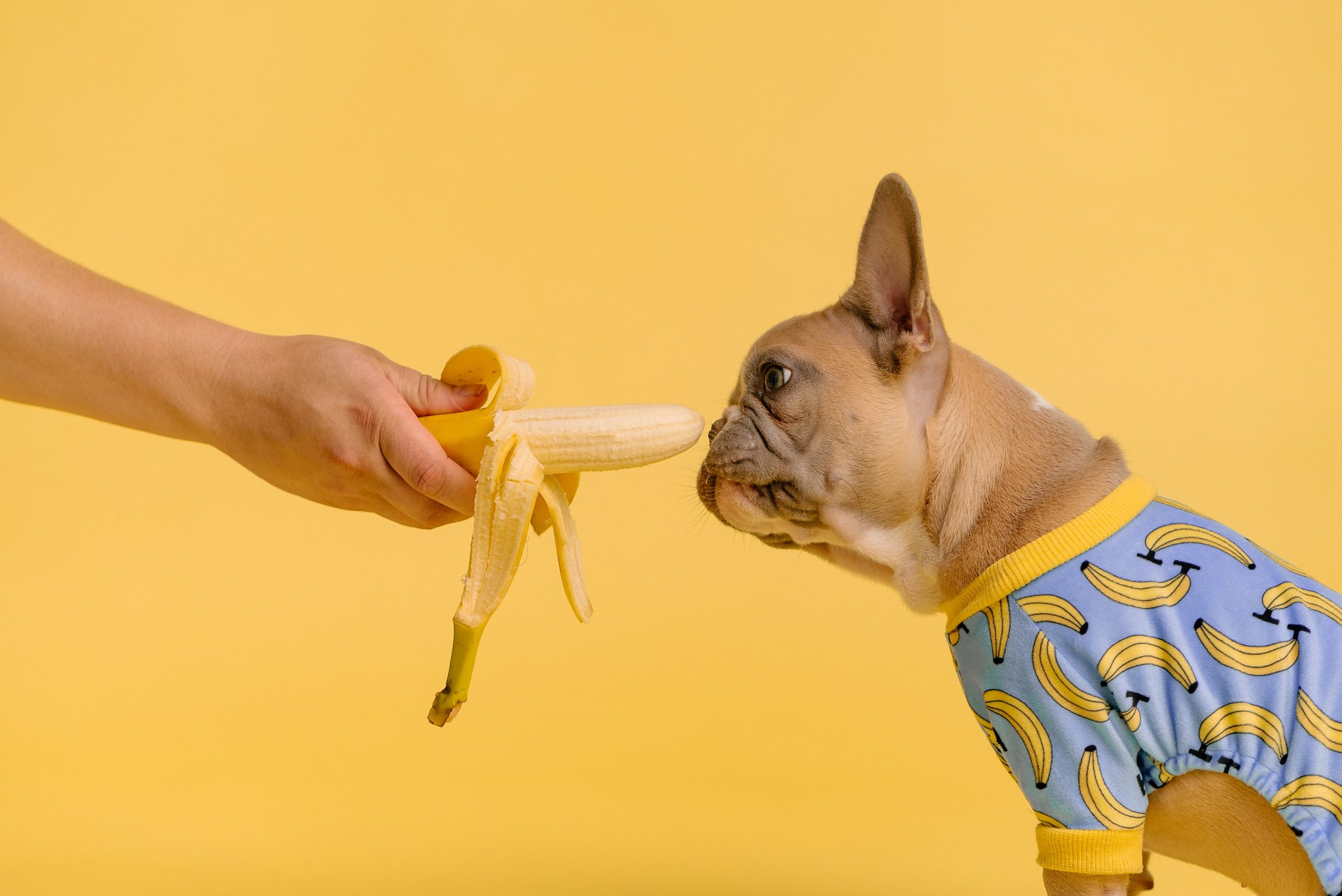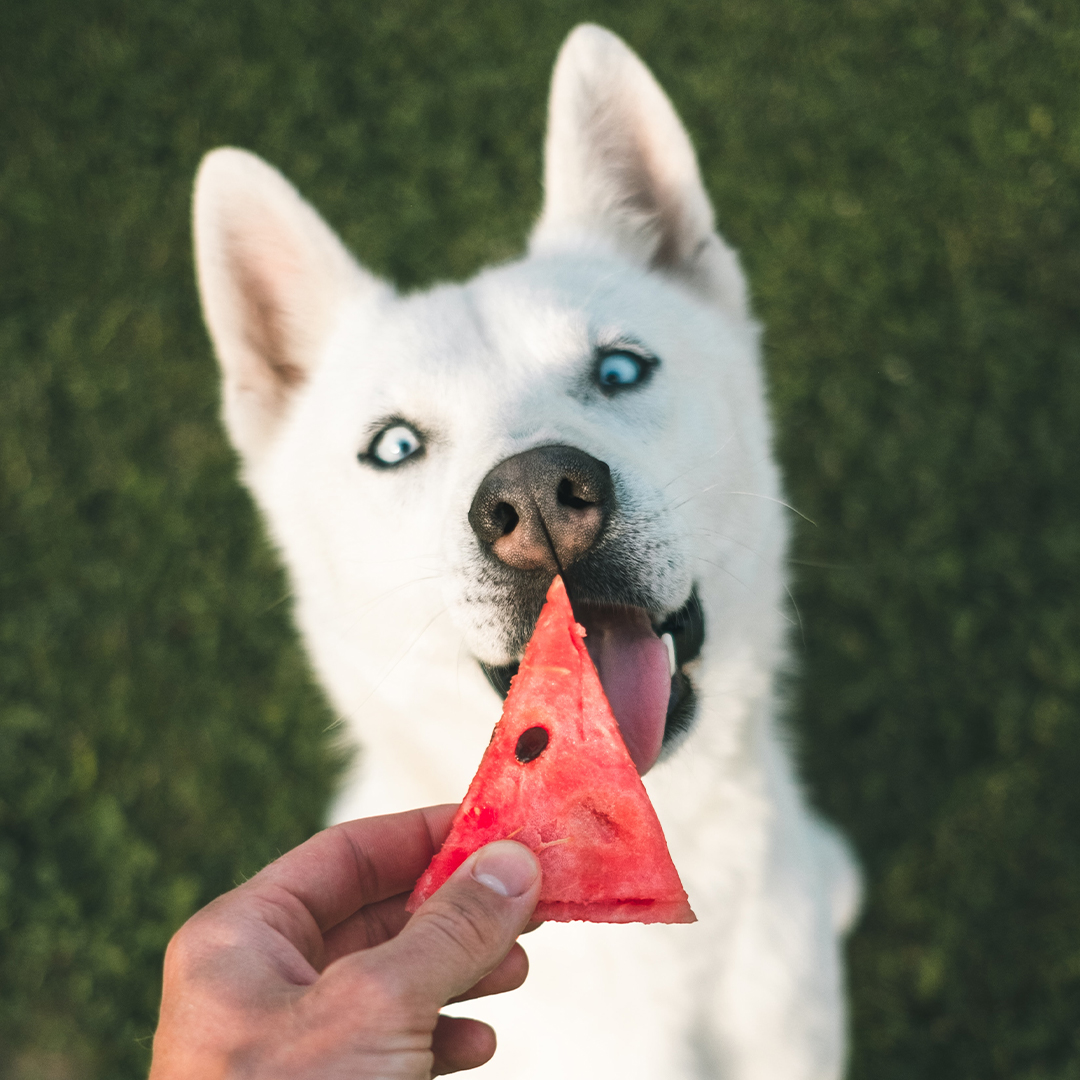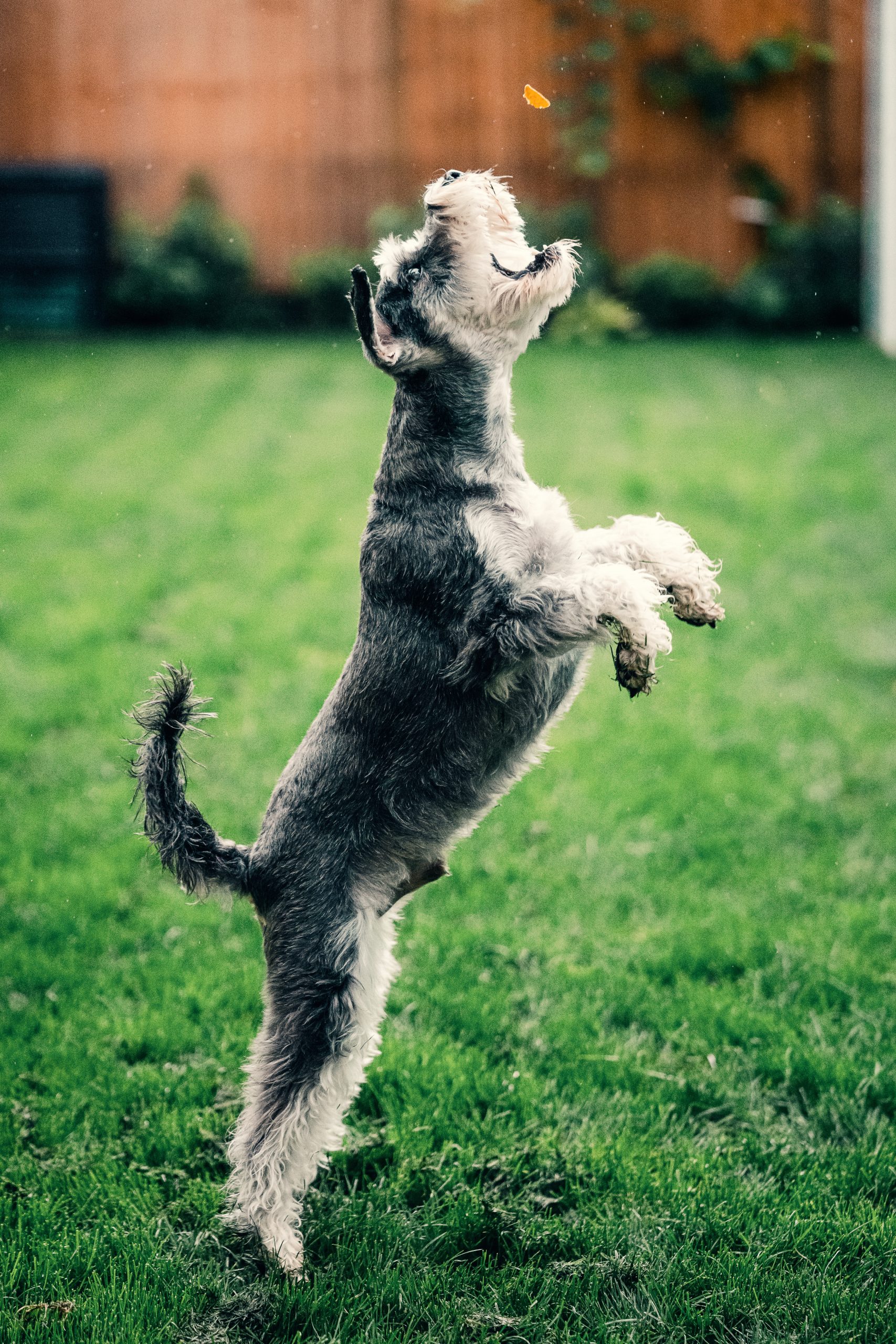
We enjoy a variety in our diet, so do our dogs! While dogs are carnivores at their core, they can enjoy other foods as well in moderation. As dog parents, it is our job to make sure that anything that deviates from that hard-wired diet is safe for our pets and won’t cause intestinal distress or worse. In small amounts, we can feed our dogs quite a variety of healthy and nutritious treats, but there are some fruits and vegetables to watch out for.
It is hoped that this list will be helpful in determining which fruits and vegetables are safe to give in small quantities to man’s best friend and which ones aren’t. Most are safe, but it’s good to memorize dangerous foods or keep this list handy to stay away from natural treats that are not canine-approved.
Good Fruits
1) Apples – Many dogs love apples and they are a healthy treat in moderation. They contain vitamins A and C and can be given naturally or frozen for an extra special summer treat. Just be sure to remove the seeds since they contain a small amount of cyanide. A few won’t likely hurt a dog, but there is no sense in taking a chance.
2) Bananas – Bananas in small quantities make a wonderful snack for dogs since they are high in potassium, fiber, and vitamins. Beware that they are high in sugar, so use sparingly.
3) Blackberries – Although their vines are thorny when picked fresh, blackberries are another great treat for our canine companions. They are rich in antioxidants and contain a good amount of fiber and vitamins K and A.
4) Blueberries – They are bite-size and have an interesting texture when bitten into. They are rich in antioxidants and include phytochemicals in the form of polyphenols and have plenty of fiber as well.
5) Cantaloupe – Is another good fruit for dogs that is packed with hydrating water and fiber. However, just like bananas, cantaloupe has a high sugar content, so it doesn’t make as good of a treat for dogs who have diabetes or are overweight.
6) Coconut – Combines an interesting texture with form and is another treat possibility for dogs that is low in carbs, but high in fat. Coconut also contains some protein and fiber and is rich in iron and copper and contains small amounts of vitamin B. However, it does not provide many other vitamins.
7) Cranberries – Both natural and dried cranberries make great treats for dogs in limited quantities. They are pretty tangy or tart, so make sure they settle well with your pooch before feeding him more.
8) Mango – Although high in sugar, mangos are another healthy treat for Fido. Mangos are full of vitamins A, B6, C, and E, and they contain a decent amount of potassium and alpha/beta-carotene. Since they have seeds that contain cyanide, just be sure to remove the pit first.
9) Nectarines – Full of vitamin C, nectarines are a great treat for dogs. Just remove the seeds and peel and you are good to go.
10) Oranges – Some dogs might not like the tangy, citrus smell of oranges, but some will. Full of vitamin C, potassium, and fiber, they are a healthy treat in moderation. As with all other seeded fruits, be sure to remove the seeds and peel them before feeding.
11) Peaches – A good source of vitamin A and fiber, peaches are enjoyed both naturally and frozen by our furry friends. Be sure to remove the peach pit since they contain cyanide which can greatly harm a dog if ingested.
12) Pears – As a good source of vitamins C and K, along with a fair amount of fiber, pears are a good treat for dogs. Since pears also have seeds, be sure to remove them to eliminate the small amount of cyanide the seeds contain.
13) Pineapple – Another sweet treat for dogs that is edible and full of fiber, minerals, and vitamins. If treating fresh pineapple, be sure to remove the outside rind and serve the interior flesh only.
14) Pumpkin – Packing a vitamin punch, pumpkins include a good amount of vitamin E, potassium, and beta carotene. Pumpkin can smooth out a dog’s digestive system helping both constipation and diarrhea.
15) Raspberries – Low in sugar, raspberries contain a lot of antioxidants that are helpful for dogs in maintaining their exposure to free radicals. Raspberries also have anti-inflammatory properties that can help with arthritic joints. Beware that raspberries naturally contain xylitol, an all-natural sweetener that can be harmful to dogs in large or concentrated quantities. A few raspberries are good, but limit it to one cup at a time.
16) Strawberries – A favorite fruit among people and animals, strawberries are full of vitamin C and fiber. They also feature an enzyme called malic acid that encourages teeth staining particles to break away from a dog’s teeth.
17) Watermelon – As a great hydration aid at 92% water content, watermelon is a great summer fruit for dogs. Watermelon is loaded with vitamins A, B-6, C, and potassium. Just be sure to remove the rind and seeds before feeding watermelon to your pooch.
Bad Fruits
18) Avocado – Although we enjoy avocados, dogs should not eat them. The seed (pit), skin and avocado leaves contain persin, which is a naturally occurring fungicidal toxin that protects the fruit but can lead to vomiting and diarrhea in canines. The edible portion of the avocado contains less persin, but it’s still more than a dog can safely handle.
19) Cherries – The fruit around the cherry seed is edible, but it’s hard to eliminate all seeds, so it’s best to not feed cherries to dogs at all. The seeds contain cyanide which interrupts the transportation of oxygen in cells. This process doesn’t allow a dog’s blood cells to get enough oxygen and they can have trouble breathing.
20) Currants – Black, red and white currents are all toxic to dogs. Even small amounts can cause trouble.
21) Grapefruit – Not only is grapefruit very acidic and bitter, and likely won’t be a temptation for your dog, but it also contains psoralen which is toxic to dogs. The skin, seeds, and pith contain the most psoralen, but the flesh has some too. It’s best for your pooch to completely stay clear of grapefruit.
22) Grapes – One of the big no-no’s for dogs is grapes and its dried twin - raisins. They are both very toxic to all dogs and can lead to kidney failure very quickly. This is one fruit that should always be remembered as off-limits.
23) Lemons – Similar to grapefruit in their acidic properties, they can cause intestinal issues with dogs. They contain vitamin C and won’t severely harm a dog, but with their very acidic nature, there are much better snacks to feed Fido. It’s best to steer clear of lemons as a treat.
24) Limes – Ditto for limes. They are too acidic for dogs to enjoy and can cause intestinal issues. It’s better to feed snacks that are better tolerated.
25) Persimmons – Containing good amounts of vitamins A and C, persimmons can be a healthy addition to a dog’s diet. However, even though the pit and seeds aren’t toxic, they can cause intestinal blockage if allowed to be eaten. It’s a good idea to remove these if you decide to give them as a treat.
26) Plums – A substance called hydrogen cyanide is the reason plums shouldn’t be fed to dogs as a treat. Most of the cyanide is contained in the pit, roots, and foliage, but enough is contained in the flesh to cause digestive distress if too much is eaten.
27) Tomatoes – Yes, tomatoes are classified as fruit because they grow from a tomato plant’s flower and contain seeds. Tomatoes aren’t of great concern for dogs if they digest one or two, but it’s better to just stay clear since the green foliage of the tomato plant contains solanine, a toxic substance for dogs.
Good Vegetables
28) Beets – Providers of vitamin C, folate, manganese, and potassium, beets are another possible snack to add to your repertoire. Beets help with digestion, a dog’s immune system and they support healthy skin and a better-looking coat.
29) Bell Peppers – This is a good treat for dogs since bell peppers pack a punch when it comes to nutrients. Just limit the amount so they don’t cause an upset stomach.
30) Broccoli – Like bell peppers, broccoli in small quantities makes a good treat. It is low in fat and high in fiber and vitamin C. Just be aware that broccoli contains isothiocyanates that can cause gastric issues in some canines.
31) Brussels Sprouts – Packed with loads of nutrients and antioxidants, Brussels sprouts make a great treat for man’s best friend. Just don’t overdo it since too much of a good thing can cause unwanted gas.
32) Butternut Squash – Loaded with vitamins A and C, in addition to containing potassium and fiber, butternut squash is a good choice to sprinkle into your dog’s menu if desired.
33) Cabbage – Purple cabbage has a great number of antioxidants and is a good treat for dogs in moderation. Like Brussels sprouts, it can cause gas, so be aware. It aids in digestion, is good for the skin, and helps fight cancer.
34) Carrots – High in fiber, potassium, and beta-carotene, both raw and cooked carrots make a great addition to your dog’s menu. Frozen carrots even help with teething for young pups or as a mid-summer cool treat.
35) Cauliflower – Rich in nutrients and enjoyed by many dogs, cauliflower makes a great supplement to a dog’s diet. Feed once a week or less to avoid any gastrointestinal issues that could cause diarrhea or gas.
36) Celery – Another great snack for dogs, celery is low calorie, crunchy, and is loaded with vitamins A, B, and C that helps fight cancer and promote a healthy heart. In addition, it is said that celery can help freshen a dog’s breath.
37) Cucumbers – A crunchy and cool snack for dogs that contains a lot of water and is packed with nutrients. It’s safer to cut up a cucumber versus feeding an entire one to your dog.
38) Green Beans – Whether raw, cooked, or canned, all forms of green beans make a great treat for dogs. They are full of vitamins and minerals and are low in calories while being high in fiber. They also help your pooch feel full without adding a lot of calories. If feeding from a can, low salt is the preferred variety.
39) Kale – Rich in vitamins K, A, and iron, Kale makes another great addition to the snack box. Kale helps provide bone and vision health for dogs.
40) Lettuce – Another good treat for dogs is lettuce. It is full of vitamins A, C, and K, low in calories and contains beneficial fiber. It’s not as helpful as red cabbage, but it’s still a good alternative compared to bread or other baked human treats.
41) Parsley – Loaded with vitamin K, parsley is a good treat for dogs. Just be aware that “Spring Parsley” in large amounts is considered toxic.
42) Peas – All types of peas from green, snap, sugar, snow, or garden peas make nutritious additions to a dog’s diet. Peas are rich in vitamins, minerals, protein, and fiber. Frozen peas make a great hot day snack. Just avoid peas with any added salt.
43) Potatoes – Baked, steamed or otherwise cooked potatoes can make a different type of treat for your pooch. However, don’t feed him raw potatoes. The toxin solanine is present in uncooked potatoes but mostly cooks out when potatoes are prepared.
44) Spinach – Spinach is another possible addition to your canine companion’s menu. However, it is high in oxalic acid, which can disrupt your dog’s body from absorbing calcium and can lead to possible kidney damage. But, it would take a large amount of spinach to cause this issue. If this treat is desired, just limit the amount given.
45) Sweet Potatoes - This can be another good treat, but it needs to be served cooked and preferably with the skin removed since the skin can be hard for dogs to digest. Sweet potatoes are rich in the antioxidant beta-carotene.
46) Zucchini – Full of vitamins, minerals, and fiber, zucchini is a favorite vegetable snack among canines. It can be crunchy and it has an appealing flavor to many. It is also low in calories, so it’s great for obese dogs.
Bad Vegetables
47) Asparagus – Although safe for dogs to eat, it’s not overly advisable since asparagus is so tough. It’s also harder for your pooch to digest because it is so hard to chew. Thus, it can cause some digestive issues and even gas at times. If you want to feed your dog asparagus, it may be helpful to cook it first to soften it up. Another drawback to feeding asparagus is your dog’s urine will smell unpleasant, or at the very least very different, just as it does when we eat asparagus.
48) Garlic – Unfortunately, not all vegetables are good for dogs. With garlic being a member of the allium family, along with onions, shallots, leeks, and chives, it is off-limits to dogs. Garlic is highly toxic in large amounts and can cause damage to the red blood vessels, making them more susceptible to rupture - which often leads to anemia. It’s best to keep garlic away from dogs whenever possible to avoid the ingestion of a large amount.
49) Mushrooms – Wild mushrooms can be toxic to humans and dogs. Since mushrooms are difficult to identify, it is better not to include mushrooms as part of your dog’s diet or snack routine. If you want to feed a store-bought mushroom plain without anything on it, that’s safer, but overall it’s better to steer clear of mushrooms since so many other vegetables are available.
50) Onions – Every part of the onion, from the flesh to the skin, leaves, juice, and processed powders, is toxic to dogs. Be especially careful with onion and garlic powders as their concentrated mixtures are even more toxic than natural onions and garlic.
As you can see, there are over 36 Good Fruits and Vegetables that our canine companions can partake in and enjoy along with us. There are only about 14 Bad Fruits and Vegetables to watch out for. A dog’s diet is typically pretty mundane, especially if dry food is commonly served, so it makes life more interesting for our furry friends when a healthy diet or snack additions are introduced to their meals.
Hopefully, the 50 Fruits and Vegetables Dogs Can and Can’t Eat list above is useful and can be implemented to spice things up for your dog(s). It’s well worth the effort to change things around while introducing some healthy additions to your dog’s diet. Man’s best friend will thank you for the extra variety you introduce.
 10 Signs a Dog is in Pain
10 Signs a Dog is in Pain
04.30.2021
Dogs feel pain just like we do, and for many of the same reasons, but the signs they display can be a fair bit different than how we show pain ... >>> READ MORE
 Cutting a Cat's Claws - The How and Why
Cutting a Cat's Claws - The How and Why
03.17.2021
If the claw needs a trim, either snip off the very tip or get in a little closer - all the while making sure to identify and stay far enough away from the quick ... >>> READ MORE
 Homemade Dog Food & Treats - Pros and Cons
Homemade Dog Food & Treats - Pros and Cons
03.03.2021
Commercial dog food is once again making the news. Unfortunately, the headlines point to a recall of dog food that contains lethal concentrations of aflatoxins , ... >>> READ MORE
 Housetraining 101: How to Potty Train a Puppy
Housetraining 101: How to Potty Train a Puppy
02.01.2021
Congratulations! If you are reading this blog article then you are likely a proud pet parent of a new puppy or you know someone who is. Housetraining, aka potty training, is the cornerstone to a happy and rewarding bond between a dog and its owner. >>> READ MORE
_______________________________________________________________
Please complete this form and click "Submit". Our Customer Support team will gladly address your request and respond in a timely manner.
Richell USA, Inc.
Copyright © Richell, Inc.. All rights reserved